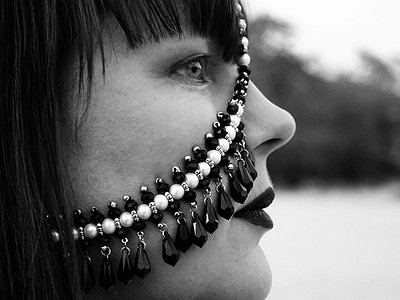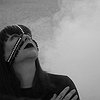Part 1
Name: Caroline Hervé / Miss Kittin
Nationality: French
Occupation: DJ, Producer, Songwriter, Vocalist
Current Release: Cosmos on Dark Entries
Musical Recommendations: Book: Chaim Potok « My name is Asher Lev ». My mother offered it to me when I was a teen, when my artistic path was inevitable. I can’t describe this book in one sentence, but it shows the burden and emergency of being an artist, the engagement of having to cut with rules and social codes to live your artist life. And yes, sometimes you don't have a choice.
Art: Vidya Gastaldon. My best friend and soulmate. She is always such a spiritual artistic guidance for me. She works on pieces who can change the energy of a room. That’s what I applied to my art too, especially DJing.
Music: The last Aphex Twin single on Warp. It’s not accessible to all listeners but he is the biggest genius of our era to me.
Contact / Website: If you enjoyed this interview with Miss Kittin, visit her website to find out more about her and to stay up to date with her releases and tour dates.
When did you start writing/producing music - and what or who were your early passions and influences? What what is about music and/or sound that drew you to it?
I started producing music when my first booking agency asked me for a track for a compilation they did to present their DJs. I called The Hacker, he was the only guy I knew who had gear. At the time I just started DJing and had no intention to be a musician. I didn’t even think of being a professional DJ, it was a hobby. I thought I would be an artist, I was in art school.
For most artists, originality is first preceded by a phase of learning and, often, emulating others. What was this like for you? How would you describe your own development as an artist and the transition towards your own voice? What is the the relationship between copying, learning and your own creativity?
I have to admit it’s pretty much in your personality whether you are a free adventurous rebellious spirit, or more conventional. I learnt by doing. Each opportunity to DJ or make a record was another door to freedom, and I always knew it could end any day so I took every chance very seriously like it would be the last. I learnt by observing other peoples' mistakes. I wanted to go my own way, without anyone telling me what to do. Never. Escaping my chaotic childhood. I think Jeff Mills is right when he says it’s better not to listen to other artist. I do because I am too curious and excited about talented minds, but when I am in my studio, I am on my own, period. Me and my crazy brain.
That’s my job, to deal with it, nourish it, cherish it, and find a way to propose my vision.
What were your main compositional- and production-challenges in the beginning and how have they changed over time?
My main challenge was to cope with The Hacker’s music, find good punch lines, tell stories. I didn’t care about singing right, I couldn’t anyways! When you get into the world of music as part of a duo and in charge of the vocals, it takes a very long time to tell yourself you CAN compose on your own. «She is not doing the music» - I heard that a lot.
I worked with fantastic producers for my solo stuff and they were the ones who told me: you are a composer, you know more than you think, you don’t have to know the technique, we are here for that, because we may read synthesizer manuals but we don’t know how to write a song, so don’t read manuals, write songs and come to us for the technical part! That was extremely liberating and the turning point.
Now I know I am a musician, a song writer to be more precise, maybe the only one on the circuit. I am a singer and DJ too, no doubt about it.
What was your first studio like? How and for what reasons has your set-up evolved over the years and what are currently some of the most important pieces of gear for you?
My studio was always small. I mostly used my computer to write the main lines and rework the textures if necessary afterwards on hardware. I moved so many times in my life I could never afford a proper home studio, and didn’t need to as I was collaborating a lot.
Now I finally have a comfy and spacious studio in my house. I go there when I have an idea, not every day. I have basic stuff: 909, 808, 606, 303 an old Nordlead rack, MicroKorg, lots of small funny toys, and lots of guitar pedals, a few microphones too.
[Read our feature on the Roland TR-909]
[Read our feature on the Roland TB-303]
My most important pieces of gear are the emotional ones. I was offered a 707 by Belgium producer Acid Kirk when I just started, and a vintage microphone from Tobi Neumann. I really care for these 2 pieces ...
How do you make use of technology? In terms of the feedback mechanism between technology and creativity, what do humans excel at, what do machines excel at?
I am such a no geek, it’s a joke. Technology has to work, has to be easy and fun. It leads to some experiments I didn’t plan for sure, but usually I know what I want and with my small studio, I manage. If it works I don’t want to change. For example I am still working with Cubase. It works, I know it. If it's too complicated it just kills my creativity.
I know a lot of musicians are thrilled by every new synth release and want to have it, and will play with it for days, but I am the opposite… probably because I need much more to nourish my creativity: travelling, reading, watching movies, nature, friends, etc… Life!
I really have a rich life outside music…. Otherwise I'd die. Music only definitely doesn’t fulfil me.
Production tools, from instruments to complex software environments, contribute to the compositional process. How does this manifest itself in your work? Can you describe the co-authorship between yourself and your tools?
First, I have an idea, a concept, a word, a line, a bassline, whatever. I go to my studio. It can happen in the middle of night, in my sleep, and I wake up to go there before I can’t remember. I record the idea as fast as possible. I set up a tempo, a beat, bass, synth line, and I record the lyrics, not in this particular order. And I go back to it the next day. The writing process is fast. The mixing and sound shaping is very long… We are not in 1993 anymore today the quality of the sound is crucial, according to technology progress.






